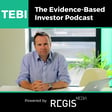Become a Creator today!Start creating today - Share your story with the world!
Start for free
00:00:00
00:00:01

Ep 30: John Turner on stock market bubbles
There have always been economic booms and busts and, sooner or later, stock markets are bound to crash. The key question for investors is: what, if anything can you do about it? How can you build a portfolio to withstand a crash and minimise its impacts? And how can you avoid being swept along by the euphoria that tends to precede a crash?
ROBIN POWELL has been putting these questions to an expert on bubbles and crashes — JOHN TURNER, Professor of Finance and Financial History at Queen’s University Belfast.
Transcript
Introduction to Financial Bubbles
00:00:04
Speaker
Hello and welcome to the TEBI podcast from The Evidence-Based Investor. I'm Robin Powell and this podcast is produced by Regis Media, a niche provider of educational and marketing content for financial advice and planning firms.
00:00:21
Speaker
Now, it probably hasn't escaped your notice that we're starting to see the B word banded around. That's B for bubble. After all, few people predicted that global stock markets would bounce back as strongly as they did from the sharp market falls we saw in March 2020.
00:00:40
Speaker
Here we are, more than a year later, with much of the world still in lockdown, large sectors of the economy stuck in the slow lane, mass unemployment on the cards, and yet, as I speak, most of the major markets are not far off all-time highs.
00:00:59
Speaker
So, are we in a bubble? What are the warning signs to look out for? Are bubbles inevitable? And if so, is there anything investors can do
Are Economic Booms and Busts Inevitable?
00:01:09
Speaker
about it? There are few people better to answer those questions than John Turner, Professor of Finance and Financial History at Queen's University Belfast.
00:01:19
Speaker
Professor Turner is a fellow of the Academy of Social Sciences and an editor of the Economic History Review. He's recently written a book with William Quinn called Boom and Bust, a global history of financial bubbles. I started by asking Professor Turner, do we simply have to accept it as a fact of life that economies and markets are bound to crash from time to time?
00:01:48
Speaker
So, Professor Turner, thank you very much indeed for your time. I suppose, you know, the question I want to start with really is, you know, this whole sort of boom and bust cycle, if you like, that we've got used to, is it inevitable? You know, do we have to accept that economies now and again are bound to crash?
00:02:15
Speaker
Yeah, so thank you, Robin, for having me on your podcast. Yeah, so I always take a very long run perspective on these types of questions. And by long run perspective, I mean, you know, hundreds of years. And the lesson of history is that the economies do go through booms and busts. They are inevitable.
00:02:36
Speaker
And I suppose then the interesting question is, you know, why do these happen? So you can think historically that, you know, it might have been due to, you know, weather and crops and crop failure would have been driving, you know, booms and busts. You come into the industrial era, it becomes more complicated to understand, you know, the role of human psychology, of course, is playing a role. The role of central banks and money plays a role in creating these. But they do seem to be inevitable.
00:03:06
Speaker
Despite what Corden Brown famously said when he was Chancellor Nick Shacker, no more Bim and Bust. I think it is inevitable.
What Drives Modern Financial Booms and Busts?
00:03:16
Speaker
So you mentioned a few possible causes there, historically, sort of crop failure today, maybe more likely to be human nature, if you like, fear and greed or whatever, government policy. What are your own views as to what the likeliest causes are of crashes in the modern era? So in the modern era, one of the main drivers of booms and busts is
00:03:45
Speaker
the role of monetary policy and of credit policy. So within modern economies, we're just landing standards with liberalised banking systems
00:03:57
Speaker
And, you know, that really seems to behind a lot of the major booms and busts. And indeed, a lot of the major crashes which have had serious consequences for economies have been underpinned by, you know, this easy lending by banks, this flooding of credit onto the market. That seems to me, you know, in the modern era to be the main driver. And that does seem to be a bit of a sort of cause for concern today, obviously, because we've had
00:04:27
Speaker
you know, cheap money for a long time, you know, how long interest rates can sort of stay as low as they are. Nobody knows. But is there a danger today, do you think, that that availability of free money might stoke a bubble?
00:04:46
Speaker
Yeah. So there's two things going on. So when interest rates are so low, it can stimulate people borrowing and they borrow them to buy bubble assets. So that bubble asset could be a house, it could be land, it could be Bitcoin, it could be stocks and shares. So that's one thing.
00:05:09
Speaker
The second thing that low interest rates do, and we see this in historical bubbles, is that it causes investors to reach for yield.
00:05:17
Speaker
So Walter Bajit, former editor of The Economist and literary critic, et cetera, et cetera, he had a saying that John Bull can withstand many things, but he can't withstand 2%. In other words, investors don't like low interest rates. And when low interest rates are prevailing in the economy, they tend to reach for riskier assets and start investing in riskier
How Do Stock Markets Predict Economic Trends?
00:05:40
Speaker
assets. So that's also something that we see happening in historical bubbles.
00:05:45
Speaker
And again, you can sort of see that happening today. I mean, there's obviously the sort of Neil Woodford blow up, which everybody's talking about at the moment because of his
00:05:56
Speaker
of Woodford's planned return. There are concerns about OD asset management, for example, a big hedge fund. There's another French firm, H2O, which has got itself into difficulties
00:06:17
Speaker
really by trying to, as you say, eke out any available yield and encouraged by its investors, if you like, to try and reach for extra yield. Is that a danger today? Is that a pattern you see happening? Yes, I do think when you look at Bitcoin, for example, and you see people
00:06:46
Speaker
piling into Bitcoin and then going into technology companies in the United States, you would have to think that investors are reaching for yield today. And that reaching for yield could be driving some of the boom that we see in tax stocks, some of the boom that we're seeing in the likes of Bitcoin today.
00:07:11
Speaker
I suppose one of the dangers to you is that people go into riskier assets, but they also maybe go into less liquid assets. During the boom times, not a problem, but then when the crash hits, as we saw with Whitford, there's a scramble for liquidity and that can really leave investors high and dry. So yeah, I am concerned about there is reaching for you today.
00:07:36
Speaker
My experience is that there is a fundamental misconception about the connection between the economy and the stock market. People kind of assume that they're very closely related.
00:07:51
Speaker
and that they will go up and down at exactly the same time and so on. But that's not necessarily the case,
Do Stock Market Trends Reflect the Real Economy?
00:07:59
Speaker
is it? I mean, how closely do booms and busts in the economy correlate with bull and bear markets?
00:08:07
Speaker
Yeah, so this is a really interesting question. And it's something that I've looked at for the UK market over the past couple of hundred years. How closely connected is what's happening in the real economy to what's happening in the stock market? And in this piece of work I've done with a couple of co-authors, what we're finding is that the stock market is
00:08:31
Speaker
two months ahead of the real economy. So the peak in the stock market is two months ahead of what's happening in the economy. And so the stock market's this great forward looking machine. It's looking into the future. It's looking into what it expects profits of companies to be out into the future. And it seems to be a good predictor.
00:08:55
Speaker
However, there is a question today regarding the stock market as to whether it's a sideshow to some extent, that it's not really reflecting the overall economy anymore. So you look, you know, United States stock market at the minute, and, you know, going through a major pandemic, you wouldn't expect the stock market to be doing particularly well, but it has been. And that's because of a small number of stocks, Tesla, the so-called FAANG stocks,
00:09:21
Speaker
They've been driving the returns on the US stock market other stocks have been doing just okay. I'm there is a question well how representative are the stocks and Tesla of the overall economy and so there is a suggestion that today the stock market doesn't really reflect what's happening in the overall economy.
What is the 'Bubble Triangle'?
00:09:41
Speaker
So you were saying that the stock market typically looks about sort of two months ahead. But clearly, as the Chancellor was saying the other day, the economy has had one heck of a shock. I mean, it was placed on the sidings, I think it was Warren Buffett's phrase last year. And that's a huge jolt to the economy.
00:10:04
Speaker
And it's hard to imagine that two months from now, things will be as good as current prices suggest they will. Yes. And that's particularly the case for, I think, the United States, the market in the United States. I think it's also the case for several other markets. I'm not so sure about the UK market.
00:10:28
Speaker
It's done okay during a pandemic in terms, but relative to what's been going on in other economies, it hasn't performed that well. And that's possibly because the UK market's been dragged back by large oil producers and companies that haven't necessarily been performing that well during the pandemic. Whereas in the United States, it's the tech firms that have actually had a good pandemic in terms of an increase in demand for their services.
00:10:56
Speaker
Hmm. I mean, in the book, you look at, is it 10 booms and busts over the last sort of 300 years? So starting, of course, with the South Sea bubble, and also mentioning some crashes, which I must admit, you know, I wasn't aware of Latin America, for example, in the 1820s, Melbourne in the 1880s. So broadly speaking, what
00:11:25
Speaker
lessons can investors learn from these crashes? I mean, are there other kind of common themes throughout or are they all very different? So one of the things that we do in the book is we have this metaphor that we use throughout the book. And the metaphor comes from the fire triangle in chemistry. And so for a fire to happen, you need heat, oxygen and fuel and then the spark happens and the fire kicks off.
00:11:53
Speaker
And so we think we see a bubble triangle in all of these historical episodes. So there's three things that you need for a bubble. So you need, first of all, as we've already talked about, you need money and credit. So low interest rates, easy borrowing conditions. That's the fuel for the bubble. Then there's the oxygen for the bubble or the marketability. So what we observe in each of these historical bubbles is that either thanks to technology or regulation,
00:12:22
Speaker
things become a lot more marketable. It's a lot easier to buy and sell assets, particularly in the bubble asset. And then the third thing that we observe in all these bubbles is the heat, which we call the speculation. And so in all of these bubbles, we see novice investors, amateur investors, people entering the stock market for the very first time.
00:12:47
Speaker
So these three things are common in all of these bubbles, so speculation, marketability, and easy money and credit. And all of the bubbles then require a spark. And this is where there's no common theme across these bubbles. A radical new technology could be the thing that sparks speculation. A political action can spark the speculation or political decisions.
Elements of Financial Bubbles and Social Media's Role
00:13:17
Speaker
can spark the speculation. Those two things are really hard to identify and they're different in each and every bubble. The three common elements, it's the speculation, marketability, and then the easy money and credit.
00:13:35
Speaker
John F. Kennedy's father, who said that the time you should start worrying is when the shoeshine boy starts talking about stock prices and so on. There certainly is a kind of sense of that at the moment, isn't there, with the internet?
00:13:50
Speaker
people talking about stocks as if they're experts, but when you look at their profiles, they're clearly kind of students or, yeah, with very little kind of previous sort of investing or trading experience. Yeah. So again, all of these historical bubbles, that's just what you see, all of the novices rushing into the market.
00:14:17
Speaker
And as you say, you know, Shishine boys, taxi drivers, you know, as soon as they start talking about shares, that's the time to be getting out. I was in Shenzhen in May 2015 when the Chinese stock market was going through a huge bubble.
00:14:34
Speaker
And I was meeting lots of people in the financial industry. But I was also meeting ordinary people and through translators talking to them. And I was having taxi drivers talk to me about the latest tech stocks.
00:14:47
Speaker
being launched on the Shenzhen market. And for me as a historian, this was fascinating because I knew that we were in the middle of a bubble. And then today with social media and then all of these amateur millennial investors, there are warnings out there for us that there's something not right when there are so many day traders, when it's so easy through these trading apps like Robinhood to buy and sell shares.
00:15:17
Speaker
And I also think in your Twitter timeline, if you're seeing stuff for Bitcoin pop up, that's almost like the modern equivalent of the Shishine boy. Isn't technology a really important aspect? Because there's no particular reason why people should be buying
00:15:39
Speaker
sort of shares now, although obviously people who did kind of join the trading boom during the pandemic, much to the surprise of sort of many sort of expert commentators, if you like, did very well because clearly the market recovered when sort of no one was kind of expecting it to do so. But it's simply the fact that all these sites like Robinhood, and we've got various trading apps here in the UK now,
00:16:09
Speaker
Combined, of course, with social media itself and everyone likes seeing what everyone else is doing, is there a danger that all those different technologies coming together is fueling a bubble as well? Yeah. Again, going back to the bubble triangle, the three sides of it. The marketability thing, it really has shot through the roof. It's so easy to buy and sell. So many of these online stock brokers are zero commission.
00:16:37
Speaker
They allow you to buy fractional shares. Particularly in the United States, where you've got some stocks that are priced in thousands of dollars, you can buy a fraction of a Tesla stock. You don't even have to buy a whole Tesla stock. That marked ability. Then the speculation through Reddit, through these online discussion forums, through social media,
00:16:59
Speaker
Instead of the coffee house or the newspaper being the place that is generating the excitement and bringing in amateur speculators, its social media and social media move so quickly compared to the old traditional press. And you're more likely to get herding effects whereby more and more investors pile into particular stocks or assets like Bitcoin.
00:17:23
Speaker
And it really does feel the rise in the asset price. Having said that, one of the concerns I would have about social media, and I think we've seen this recently, is manipulation. It is possible to manipulate people on social media. And so you may have large sophisticated investors, either manipulating smaller investors or actually engaging in their scanning social media.
00:17:53
Speaker
and they're trying to ascertain using artificial intelligence what the sentiment of investors is, and then they're basing their trading strategies off the back of that. In the book, we do talk about social media in China because during the 2015 bubble,
00:18:13
Speaker
Chinese controlled state press, of course, is going to do what the Chinese government wants. And so they pumped the bubble or puppet. But they also were paying social media commentators to influence people. And so people were being paid per social media comment to actually help pump up the stocks in China.
00:18:35
Speaker
Really. So you mentioned these three factors which are generally present in all of the bubbles that you've looked at, but that still doesn't make bubbles kind of easy to predict, does it? I mean, are there any other kind of warning signs that investors should be looking for? Is there a kind of
00:19:02
Speaker
you know, early warning system, you know, that investors can sort of assemble to reduce the chances of them getting caught up in one of these bubbles. Yeah, so this is a question very commonly asked, can we actually predict bubbles? And I think one of the lessons that we draw out from the book is that it is very, very hard to predict bubbles in real time.
00:19:26
Speaker
And it's even hard to look back in time and definitively say that there was a bubble and what were the causes of those bubbles. So if it's difficult with the benefit of hindsight, it's super difficult in real time. So in the final chapter of the book, we try and draw out some lessons for investors. And so we come back to those three sides of the bubble triangle. If those three things are present,
00:19:50
Speaker
doesn't necessarily mean that there's a bubble, but it means that you should be alert to the possibility that there's going to be a bubble, because the necessary conditions have been met. But bubbles are ultimately caused by these sparks. And sparks can be new technology. And it's really difficult to know where new technology is going to come from, or if a new technology is developed, if it's going to be widely adopted, if it's going to be successful. So standing back in the mid-1990s, who knew that the internet was going to be such a wonderful thing?
00:20:20
Speaker
who could really foresee that. Okay, you could take a punt and say, well, yeah, it's going to do okay. But we didn't know for sure.
How Do Central Bank Interventions Affect Markets?
00:20:28
Speaker
And then with government policy, again, it's very hard to predict what the spark from government policy would be. It's hard to predict the future. And so I suppose our advice to investors, if they want to try and figure out if there is a spark out there, then they need to
00:20:45
Speaker
They need to spend a lot of time and they need to develop what we call new mental models. They need to think about how the economy is functioning. They think about how financial markets are functioning, but also psychology of investors, sociology. And we also like technology trying to understand developments in technology. You know, it's just that need to educate yourself. But I think our main piece of advice to investors is don't get caught up in bubbles. Sit them out.
00:21:14
Speaker
Yeah. Right. Okay. So once it's already started, it's too late. You know, the value of your portfolio has fallen. So you might as well just stick there and see how long it lasts rather than sort of panicking.
00:21:30
Speaker
Yeah, because I suppose the crash, I mean, if you could even call it a crash of sort of March 2020, I mean, it didn't last very long, did it? I mean, it was certainly by August that most of the major stock markets had actually recovered from those lows we saw in March 2020. Yeah. So this actually raises a really interesting point because
00:21:55
Speaker
We can think of March 2020 in one of two ways. First of all, there was an overreaction. And so investors panicked. And so they're rushing for the exits. And that's driving down the asset crisis. That's one way of thinking about it. But the way I think about it is that central banks around the world stepped in. Central banks around the world are underwriting the market. And particularly in the United States, where you had a president who was obsessed with the stock market and how the stock market was doing.
00:22:25
Speaker
the central bank steps in and it was that central bank underwriting of the market that I think encouraged then, it stopped the market falling and it encouraged the initial rebound that we saw on the market. I think other things have taken over since then, but that raises questions then about what investors, so investors know that the central bank or governments are going to step in and stop the market
What Differentiates General and Sector-Specific Market Crashes?
00:22:53
Speaker
falling. How does that change then?
00:22:55
Speaker
the behavior of investors and do they take more risk then because they think well the central bank's gonna stop you know the market crashing there's going to be that green span pit that protects us and so that that actually creates concerns for me moving forward. So there are general stock market crashes but we also have crashes that involve particular sectors don't we I mean obviously
00:23:19
Speaker
A very, very well-known one was the sort of tech bubble, the dotcom boom at the end of the 20th century. And very often when these sort of bubbles occur, it doesn't necessarily infect the whole stock market. I think I saw you share something the other day, John, about, for example,
00:23:41
Speaker
the massive crash in bicycle stocks at the end of the 19th century, for example, which obviously was catastrophic for the West Midlands economy where I am. But generally speaking, it hardly registered. So I suppose there's an important distinction to make there between sort of general market crashes and particular sort of sector crashes, if you like.
00:24:09
Speaker
Yes. So I think that is an important distinction, but also an important distinction in terms of what's the spark behind the bubble. So in both the case of the dot com and bicycle stocks, it was a new technology.
00:24:26
Speaker
And the boom happens in the new technology part of the market. It doesn't happen elsewhere in the market. And so when the new technology part of the market crashes, there isn't the same sort of spell over of facts into the general economy because of that.
Can Technological Bubbles Benefit Society?
00:24:43
Speaker
So that kind of partially explains why that happened.
00:24:48
Speaker
But when you try to speculate on a particular technology doing well in the future, it's not as easy as that, is it? Because historically, I've interviewed
00:25:06
Speaker
Elroy Dimson and his colleague David Chambers at Cambridge about this. And their view is very much that when there is a kind of new paradigm, if you like, like, I don't know, railways in the 19th century, very often the advantages, the benefits of that new technology don't accrue to the stockholders, they accrue to the general public and the consumer, if you like. And very often,
00:25:33
Speaker
But even if a technology is hugely successful, I suppose like the internet, if you like, you still see a crash in that sector. It's a really interesting point you make there in the sense of the general public tend to benefit, not the initial investors. And you do tend to observe this with some of these technological bubbles that
00:26:00
Speaker
they're actually good for society. And we could call them useful bubbles in that regard.
Social Media's Influence on Stock Speculation
00:26:06
Speaker
But as you say, investors or the vast majority of investors actually lose out. One way of thinking of these technology stocks is that there's lots of them come to the market. Most of them fail, but there's one or two who do really well.
00:26:20
Speaker
So, for example, how do you invest it? I think we talk about this in the book. In Amazon's IPO, back in the 1990s, and you held that stock today, you'd be a very wealthy individual. But how do you invest it in 20 other stocks, you probably would have lost all your money. So there is that sort of lottery element to some of these technology companies. And we don't know which ones are going to succeed. So again, with the bicycle stocks, there was like 600 plus bicycle companies.
00:26:50
Speaker
And who knew that, well, Raleigh was going to be the one that came out on top.
00:26:55
Speaker
and many of the others failed and vastly were lost their money. Because even if you buy a fund, I'm thinking today, for example, I mean, I suppose it's a bit of a no-brainer that driverless cars are going to play a big part in the future. But even if, say, in the next few years, you invest in a fund that gives you exposure to a wide range of companies involved in that sector,
00:27:24
Speaker
As you say, only one or two probably will actually become the kind of Amazon of that sector in the future. Yeah, so it's interesting actually you say that because some of the best performing funds last year in the United States were green technology funds. So again, people are seeing the future, they're seeing the way different policies moving. And who knows?
00:27:50
Speaker
you know, whether the, you know, how many of the companies in that that fund will actually, you know, be still around in 10 years time, and to actually produce a return for investors. Well, that's interesting, because there is this sort of major kind of shift isn't there towards ESG investing. And increasingly, I suppose it will, ESG will become sort of mainstream over over the next few years, but
00:28:18
Speaker
We've seen prices relative to sin stocks, if you like, go up quite dramatically in, well, certainly the last year or so. Is there a bubble being stoked there, do you think? Yeah, so potentially.
00:28:34
Speaker
And again, it could be coming from the spark of government policy, because again, governments around the world have really been pushing the move to net zero. And therefore, companies are falling in line behind that. And so potentially, we could be looking at a bubble in these types of stocks. And so Tesla is a prime example, I think, of a stock that has benefited from this push for green technology.
00:29:02
Speaker
But it would worry me that that's also driving a bubble in Tesla stock and other types of stocks that are working within the whole area of green technology. We mentioned social media and the role that that plays in stock bubbles and so on.
00:29:22
Speaker
I mean, Tesla is extraordinary, isn't it? Because Elon Musk only has to tweet something and the price may shoot up or it might shoot right down. There's another example of technology possibly creating a sort of spike in Tesla, for example. Yeah, certainly when Musk tweets things happen.
00:29:47
Speaker
And also there's almost like, so amongst a lot of the amateur millennial investors, there's like a cult-like aura around Elon Musk. And so when he says Tesla's going to invest in some of their cash in Bitcoin, people get really excited by that and they see him as an outsider.
What Does the GameStop Saga Reveal About Market Influence?
00:30:08
Speaker
And so therefore he's able to attract a lot of, he's like the pied piper of Hamlin attracting a lot of the young millennial investors behind him.
00:30:16
Speaker
So yeah, that would worry me as well. And of course, GameStop was an extraordinary saga, wasn't it? A few weeks ago, where we saw these sort of young, sort of inexperienced investors sort of driving up the price of a stock and presumably a lot of them getting their fingers badly burnt. Do you think the lessons will be
00:30:43
Speaker
learn from that or do you think we'll see more GameStop type situations in the future? So GameStop was super interesting because again, taking the historical perspective, we have seen short squeezes in the past, but it's typically not been a bunch of amateur investors colluding together. It's typically the insiders within a firm, whether it be large shareholders or directors who are, you know, so their stocks being shorted and so they try to corner the market.
00:31:11
Speaker
and squeeze the short sellers. So we saw this, some really good examples during the bicycle mania that actually ended up going to court. So then, you know, we come forward to GameStop and here we've got another short squeeze, except it's now being coordinated by social media. But I think what I would want to wait a few months to see who has won and lost because
00:31:37
Speaker
OK, so there's a lot of amateur investors rushing in, putting the squeeze on the hedge funds who were shorting game stock and other types of stock. But you have to be concerned there was a lot of manipulation, market manipulation going on. And really, until we have that investigation, it's going to be difficult to really know who won and lost and whether we're going to see that type of thing happen again.
How to Weather Market Bubbles with Long-Term Strategy?
00:32:00
Speaker
So what does all this then mean for portfolio construction and investment strategy and so on? As you've explained, there are a few warning signs, but basically predicting a bubble is sort of fiendishly difficult.
00:32:18
Speaker
So is there a case for just taking the sort of Rick Van Winkle approach and going to sleep for 30 years and just trying to blot everything out and say, look, sometime over the next 30 years, there's going to be probably three or four major market downturns.
00:32:42
Speaker
But heck, I don't know when they're going to happen, so I'm just going to sit and all out. Is there a case for doing that? So for most investors, I would say that that is what they should do. Because one of the lessons of stock market history for me, or several lessons, one is it's really difficult to time markets. You know, if people are trying to sell at the top, buy at the bottom, that's really, really difficult to do. And so history tells me that timing markets is really difficult.
00:33:11
Speaker
But history also tells me, and this goes back to, you mentioned Elroy Dimson and his colleagues who have produced these wonderful return series for all these economies across the world back to 1900, looking at the equity risk premium.
00:33:26
Speaker
And so if you're holding a balanced portfolio, you're going to earn a premium over government bonds that's depending on the economy you're in. It's going to be of the order of 4% to 6% per annum. And again, the lesson of history, you compound that over time, over the 30 years, you're going to be doing
The Impact of Inflation on Investments
00:33:43
Speaker
OK. The third lesson of history, I think, for the sort of everyday investor is to be aware of inflation.
00:33:51
Speaker
because inflation can come along and hit investors with nasty surprises. It's a long time since we in Western democracies have witnessed high inflation, but the high inflation of the 1970s, what did that do to fixed income? It really hurt fixed income investors. During the First World War, we had four years of inflation of close to 15%.
00:34:15
Speaker
What does that do to fixed income investors? Really, really hurts them. Again, investors need to be aware of inflation and the dangers of inflation. If you're holding lots of cash, lots of different bonds, you need to take into account that inflation can happen and can very quickly erode the value of your holding.
00:34:33
Speaker
So what do you say about that kind of defensive part of the portfolio that, you know, somebody like James Tobin, for example, the guy behind separation theorem said we should have an offensive part of the portfolio, attacking part and a defensive
00:34:53
Speaker
In the defensive part, presumably you would say bonds would you, although there's some concern about bonds that they might not be such a brilliant diversifier at the moment. Yeah, bonds, you know, but also, you know, really traditional utility stocks.
00:35:15
Speaker
you know, also could be part of that defensive part of your portfolio. And what about corporate bonds? Because corporate bonds, you know, when equity markets are frothy, if you like, corporate bonds can act a bit like equities, can't they? Presumably you would say sort of short dated government bonds, gilts, treasuries are better for a kind of dampened portfolio risk.
What are Defensive Investments for a Balanced Strategy?
00:35:44
Speaker
Yeah, because the thing with corporate bonds, well, there's a couple of things with corporate bonds, particularly in the UK. Historically, we've had a very small market relative to other countries in corporate bonds. And you would also have to be worried about the liquidity of the corporate bond market because of that. And then there's the credit risk associated with corporate bonds, as well as that inflation risk. You've also got the credit risk.
00:36:14
Speaker
So yeah, you know, short-dated treasuries would be preferable. So you were saying that you thought that the best approach for most investors, hard though it is to sort of ride out these bubbles. So presumably you would say that means investors deciding on their capacity for risk, if you like.
00:36:38
Speaker
and then sticking with it and rebalancing their portfolio every year or so, or what would your suggestion be there? Having a well-diversified portfolio, as you say, across different sectors, across different risk classes, and rebalancing that.
The Importance of Diversification and Dividends
00:36:56
Speaker
Also thinking about your dividend income. Dividends, again, I've looked at dividends over 200-year dividends.
00:37:04
Speaker
used to form a really important part of the return to investors who say in fact that the predominant part that's no longer the case but I still think dividends have an important role to play and you know reinvesting that dividend income is also if you're wanting to build up you know something for your retirement is super important.
Lessons from Historical Bubbles
00:37:24
Speaker
Just one final question been absolutely fascinating talking to you John.
00:37:29
Speaker
You know, of all the bubbles that you looked at, is the one that you really thought, wow, this absolutely deserves more attention that it's been given. We all know about the South Sea bubble, for example, and obviously, you know, because we've lived through the sort of more recent ones, we can kind of recall those, but is there, have you got a favourite bubble, if you like? Yeah, that's it.
00:37:58
Speaker
Yes, I do. And that's the bubble that took place in Australia in the 1880s. So it was probably the first major bubble that had devastating economic consequences.
00:38:15
Speaker
for an economy. So in the 1880s, Melbourne and other parts of Australia went through this huge property boom that also spilled over onto the stock market because a lot of the property development companies, a lot of the banks got involved in funding this bubble. The government were involved because they were deregulating the financial system. So we had almost a completely deregulated financial system. We had no central bank.
00:38:44
Speaker
There was in essence no regulation of banks and it was a great party while it lasted. But then it burst and it had dramatic consequences. Half of Australia's banks at the time failed. Australia entered a deep depression and it took Australia two decades to recover from the economic fallout of that bubble. So because of that sort of
00:39:14
Speaker
You know, the fact that it happened in the near or a country where there's no central bank, where the banking system was deregulated, it kind of makes it fascinating for me. But then there was long run economic consequences that show us really the dangers of these types of bubbles is the other thing that really fascinates me.
Conclusion and Invitation to Subscribe
00:39:32
Speaker
So yeah, Australia in the 1880s, that's my favorite bubble. Excellent. John, thank you so much for your time. Briefly remind listeners what your book's called and how they can buy it.
00:39:44
Speaker
So Bim and Bust, a global history of financial bubbles. It's available at all good retailers online and from your local big stores as well. Published by Cambridge University Press. And I can certainly recommend it too. John, thank you very much indeed. Thank you very much Robin.
00:40:06
Speaker
You've been listening to me, Robin Powell, interviewing John Turner, professor of finance and financial history at Queen's University Belfast and co-author of Boom and Bust, a global history of financial bubbles. If you've enjoyed this podcast, please subscribe to it on iTunes or on SoundCloud. Better still, why not write a review on iTunes?
00:40:31
Speaker
Thank you to Regis Media for producing and funding this podcast. Thank you to John Turner. And most of all, thanks to you for listening. Until next time, from me and our producer James Cresswell, goodbye.
















